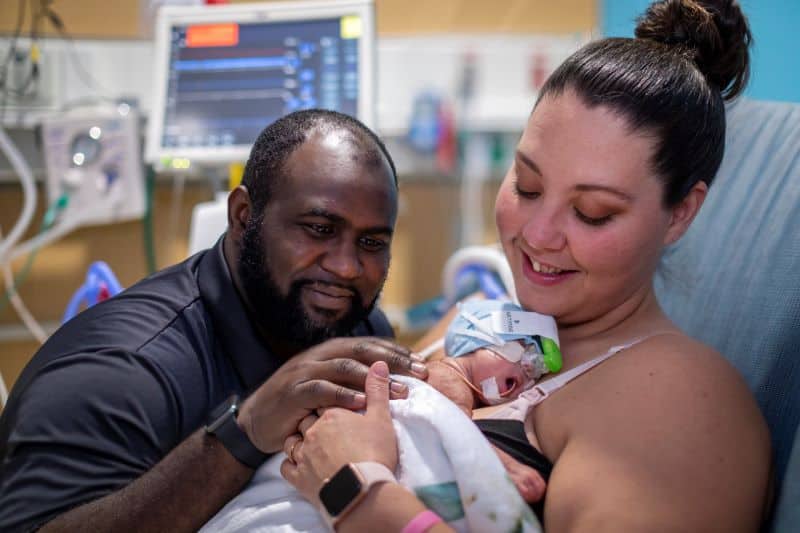The Benefits of Kangaroo Care with your Baby
International Kangaroo Care Awareness Day on May 15th brings attention to this important method of developmental care for babies through skin-to-skin contact. The neonatal intensive care unit (NICU) at Johns Hopkins All Children’s supports kangaroo care to help families bond with their new baby.
How to do Kangaroo Care with Your Baby
Kangaroo Care involves the parent holding baby on their chest, resting directly on their skin. Baby’s head should be turned to one side so that their ear is on your heart. Then, cover the baby with a blanket to keep in the warmth. It’s encouraged to do this for at least an hour for maximum benefits–from parent-infant attachment to optimal neuro-sensory input for the infant’s developing brain and more.
Additional benefits include:
- Improved immunity
- Better weight gain for preterm babies, helping them leave the NICU sooner
- Reduced stress
- Decreased crying
- Improved sleep
- More stable breathing
- More stable heart rates
- Increased initiation, duration, exclusivity and success of breastfeeding
- Better warmth/temperature regulation than incubator
- Increased confidence and competence in parents
It is important to avoid perfume or smoking before this skin-to-skin contact. Also, it may take a few minutes for your baby to settle down and become comfortable during kangaroo care. Many babies soon fall asleep on the parent’s chest but it is important that the parent should never fall asleep during skin-to-skin care.
Preparing for Baby’s Birth
Experts at Johns Hopkins All Children’s encourage expectant mothers to find out the Kangaroo Care practice at the hospital where they will deliver. Since nurses can do most newborn care with baby-on-mother after the first hour of life, plan to hold your new baby skin-to-skin immediately after birth.
If you have a C-section, or if your baby is premature or needs to go to a NICU for another reason, hold your baby in Kangaroo Care as soon as possible. Kangaroo Care is the only way to hold small premature babies at first because of their size and risk of getting cold.
For more information, visit: Kangaroo Care.
Dr. Chang specializes in neonatology with the Johns Hopkins All Children's Maternal, Fetal & Neonatal Institute. She sees patients at the Johns Hopkins All Children's main campus. She completed both her pediatric residency and a fellowship in neonatal-perinatal medicine at the University of Florida in Gainesville. She is a graduate of the USF Health Morsani College of Medicine. Her clinical interests include neonatal nutrition and hypoxic ischemic encephalopathy. Dr. Chang also holds a master’s of science in applied physiology and kinesiology from the University of Florida.
*Presented by Johns Hopkins All Children's Hospital


